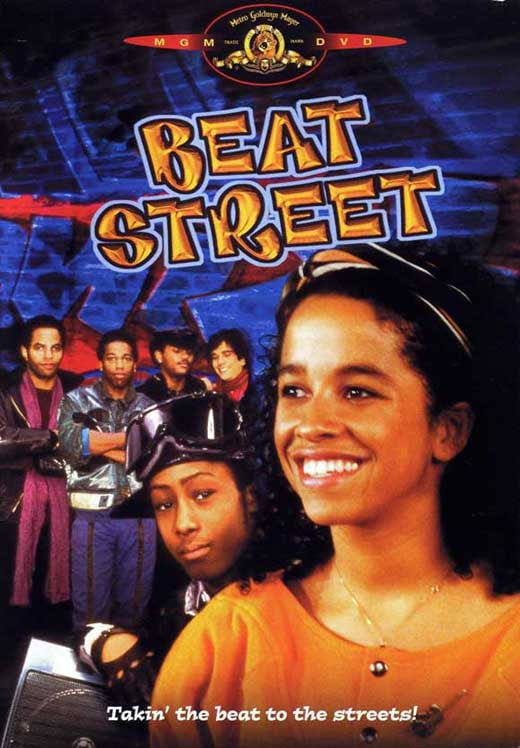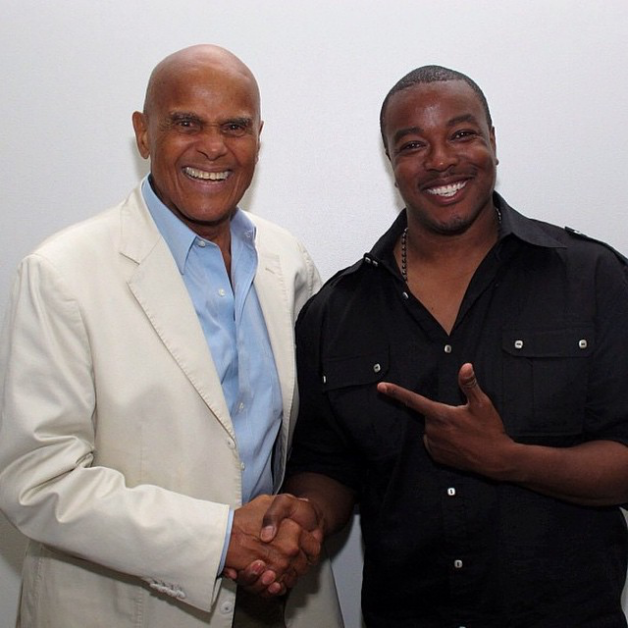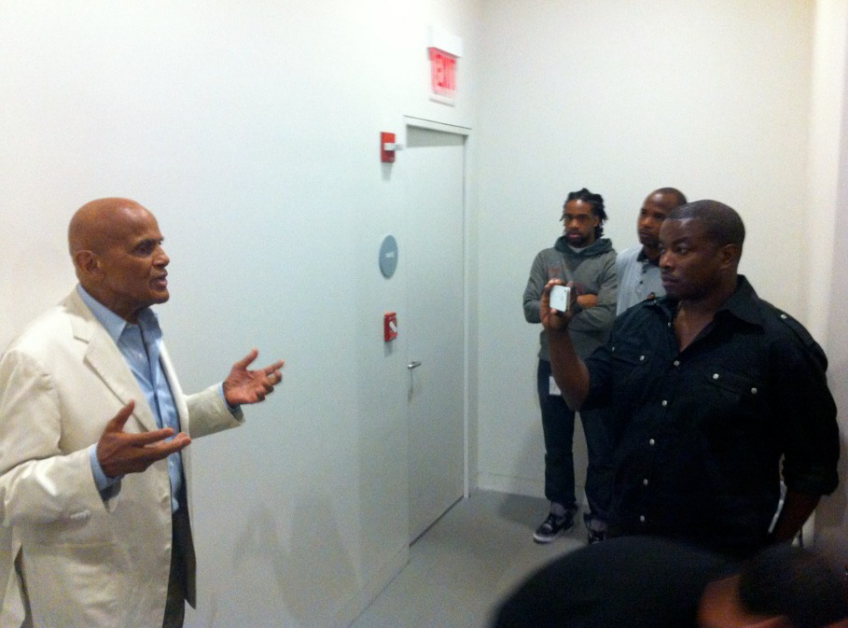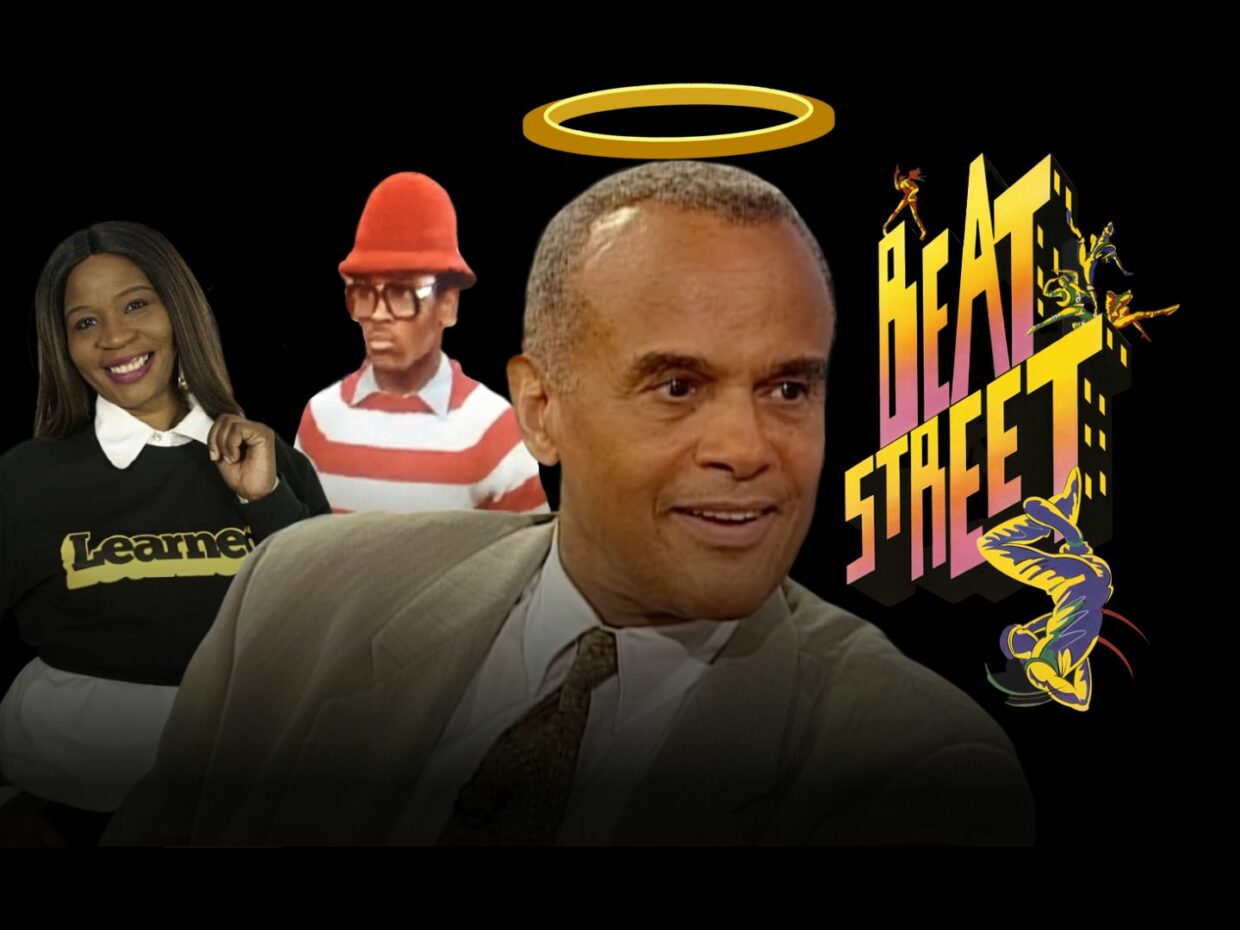We mourned the loss of the remarkable entertainer, activist, and humanitarian Harry Belafonte this hyear. While much has been said about his contributions to music, acting and the Civil Rights Movement, not enough attention has been given to his efforts in promoting Hip-Hop in Hollywood. It’s been 39 years since “Beat Street” was released, and it represented a significant milestone on several fronts.
Firstly, it was one of the pioneering movies to authentically showcase Hip-Hop from a New York perspective, specifically from The Bronx. With Mr. Belafonte serving as the producer, he ensured every aspect was executed flawlessly. Even today, actors and performers continue to receive royalty checks from the film. “Beat Street” gave rise to numerous stars, both in the Hip-Hop community and the acting world. MC Debbie D and the remarkable dancer Mr. Wave, a member of the renowned New York City Breakers crew, were two of the talents who emerged from this influential movie.
In honor of the late and esteemed Harry Belafonte, Chuck “Jigsaw” Creekmur brought together these two alumni of “Beat Street” to discuss the groundbreaking film and enduring impact of this great man who championed the culture.
WHO THEY ARE
MC Debbie D: Well, my name is MC Debbie D. I’m one of the matriarchs of the culture, which basically means one of the mothers, because I show up so early in the game. Which is in the ’70s from the South Bronx, Webster Houses and that’s where I started at on the mic. I’m a native Harlem girl, but I showed up in the Bronx in 1976 and hit the mic in 1977.
Mr. Wave: My name is Mr. Wave and my group was called the New York City Breakers. We were, at that time, one of the influential breakers on the planet. And I am too bred from the Bronx, born and raised out of the Bronx, and traveled a lot and done a lot for the culture. That’s because of the catalyst, Harry Belafonte.
ON HIP-HOP TURNING 50
AllHipHop: Before we talk about “Beat Street,” let’s talk about Hip-Hop real quick. On your thoughts on this 50 year anniversary, this landmark period in the culture as well as in American culture, not just Black history and Brown history. What are you guys thoughts about the 50th anniversary of Hip-Hop?
MC Debbie D: Well, I’m in high celebration, as most pioneers probably confess. And I would say with them, we never thought it would really get this far. For years, as a kid, they kept telling us that it was going to be a fad. So we functioned on that level. Though we did what we did and we loved what we did and we did it continuously every day in the summertime. And also every weekend on the weekends and everything. But we really didn’t think it would really live out for 50 years. And so this is a hot time for us. And I’m proud to say as a pioneer, as a matriarch, along with all my brothers and sisters who are pioneers, we are the only ones who can really say that we are celebrating 50 years. So I’m honored just to be able to be say that. So it’s an exciting time.
Mr. Wave: Yeah, and I agree with Debbie. I think that the fact that it is recognized on a global level, is necessary. It allows lessons. It allows people to know what we’ve done for the culture and what it took to get here. It allows us to educate the babies and have them understand how important… 50 years in itself is important, any genre holding 50 year banner is really dope. But the fact that it’s a culture that we started. If you think about demographics, you think about at the way that technology is today. It wasn’t there for us. And we still here.

HOW MR. HARRY BELAFONTE IMPACTED HIP-HOP
Mr. Wave: But what I can tell you, in regards to Harry Belafonte and what he, as a gentleman, as a man, as a catalyst, did for us. He inspired us in different ways. Where he showed Lee and Debbie affection. He allowed some of us to generate this energy. He allowed some of us to create and he leaned on some of us, like the Melle Mels of the world.
He was very good at what he did. He was skillful, but he allowed some of us to grow, like me, and gain insight. It is just a very powerful man. And the fact that he merged Hip-Hop and our culture with art. And when you combine the two, you got something called “Beat Street.”
MC Debbie D: When I think about him, when we did our scene in “Beat Street,” me and Us Girls. We just kind of did our scene and I think we showed up again toward the end of the movie. And then we came back for the premiere. And it was at the movies premiere that you really got a chance to see all of these different characters and to see the movie and the fullness at one time. But it was, at the time, I was just 21 years old, so I didn’t process a lot of things.
But as I got older, and I began to look at the movie, one of the things that impressed me the most is how Harry Belafonte pulled on his resources. And what I mean by that, is when you look at Kenny. Kenny, who is the star of the show as the DJ. And he is the son of Ruby Dee and Ossie Davis, which are amazing Black actors.
And I thought that was phenomenal. And then you have Rae Dawn Chong, who is the daughter of Chong of Cheech & Chong. These are people we grew up watching.
Mr. Wave: Yes. Yes. So what Harry was able to do is because he took a chance on us. He took a chance on Hip-Hop. And he wanted all of the elements there. See, we don’t live in the elements anymore.
The five elements of Hip-Hop. That’s why our younger generation is missing. Because I knew how to rap, I knew how to break dance, I knew how to pop, I knew how to hear music, I’ve been in studios. That’s gone. Harry realized that that was a key component to the culture. But what can I add to this culture because it should not die here.
MC Debbie D: Again, he used his star power. As a young kid growing up in Harlem, again, he was a name and a face. Everybody knew “The Banana Boat” song. Everybody grew up with that song. And seeing him on TV and all of those popular movies and TV shows and everything. But again, to say there’s something going on underground in the South Bronx, in particular. “Beat Street” is basically focusing in on the Bronx scene, is in the South Bronx. And of course we know at that time the buildings were burning down. It was a lot that was going on. But he used his own star power. He is a star.
And for him to put his own impression on it is one of the reasons why, again, as Wave says so poignantly, that allowed us to get our stardom. When I look at it now, I say to myself, my legacy is tied to his legacy. What an honor because he was just such a great man. So when you look at Jet Magazine and you look at all of these different publications that you have today, with his face on it. He didn’t have to do that. He could have stayed behind the scene.

THE TIGHTROPE OF MAKING A MOVIE THAT SERVES BOTH THE CULTURE AND THE STREETS
Mr. Wave: I think it’s true story. I think films, first of all, are hard to make. Let me just tell you why. Harry did not, and I make films today or documentaries, and I learned that from the movie “Beat Street” and Harry’s style. When you create a film, you have to concentrate on the masses. It’s not regulated to a culture or a genre. He was able to accomplish that. And I tell people every time that I speak to, when I say they go to film, they complain about what Hollywood needs. And they don’t understand, Harry understood. If you get 80% of your story in there, 20% of Hollywood, you win it.
Harry won.
MC Debbie D: And I think that’s one of the reasons why, even though in Hollywood standards, it didn’t do that well at the box office. But once it actually hit a Blockbuster, if anybody remember that place, once it hit those DVDs, those kids never returned those DVDs back.
And now it’s on a global scale. We’re still getting paid from it. We still get the residuals to be able to see from SAG all the different places where it was at. And I think that was only because Hollywood realized, and Harry realized, I need to make sure that I do it in a way where it’s palatable for a larger audience. And again, knowing that from his own background and his own experience in Hollywood, is what makes him so awesome about being the perfect person to do it.
HOW HARRY BELAFONTE MADE THE WAY FOR BARACK OBAMA TO BE PRESIDENT
Mr. Wave: This really short story. Harry Belafonte was an influencer. He was a reason for something that happened in our lives as major. I’m doing a documentary on Dr. Khalid el-Hakim, the Black History 101 Mobile Museum. And in his documentary, he has this document. And a document has three signatures on it. It has Harry Belafonte’s signature on it, Sidney Poitier, who was his boy, and it had Jackie Robinson’s. Those three got together and put the money together to bring it 55 Africans over to the United States. Well, one of those got in…And then went to Harvard, went to college. One of them became very, very famous. And I know you don’t know who it is, I’m going to tell you. He brought Barack Obama’s father over.
Is that not amazing? So there would be no black president without Harry Belafonte.
[Editor’s Note: During the 1950s, Harry Belafonte showed his support for the African American Students Foundation. This foundation provided a grant to Barack Obama Sr., the father of the 44th U.S. president, Barack Obama, enabling him to pursue his studies at the University of Hawaii in 1959. He would later study at Harvard. Barack Obama II was born August 4, 1961 in Hawaii.]
MC Debbie D: Paying it forward…that’s part of what Hip-Hop is about, paying it forward and pulling other people to the forefront. And I want to just pause and thank you (Chuck Creekmur) because that’s what you’re doing through this platform right here that you have. Again, it’s your resources. You used your resources and said, “Hey Debbie, come on. Hey Mr. Wave, come on.” And through this platform, other young people will get a chance to see. Because this is documentation of what it was like for us in our young years to connect with someone. So you are paying it forward. We are paying it forward. And thank you so much for doing that.
BRING ON THE LADIES – “US GIRLS CAN BOOGIE TOO”
MC Debbie D: Well, the first thing is, when we first went met Harry Belafonte at the Roxy. We were not called Us Girls. We were called Empress. Was the name that we came up with, back in the day before all of that. Lisa Lee used the term Queen. I used the term Queen. And we never had any issues, to this day. She’d say Queen MC, I say Queen MC or Queen rapper. But so we would call Empress because we thought of ourselves as the queens. We were the top of the line above everybody.
And so when we got to the movie and we began to go to the studio to perform the song and learn the moves and all of that kind of stuff. The name of the song, as you know, was “Us Girls can boogie, too.” We didn’t think too much of it at the time, because it really didn’t have that Hip-Hop swag to it. And they said, okay, here’s the space where you can do your thing and say whatever it is that you wanted to say. It took for me, it took a few years before I actually realized what they were really trying to convey.
And the point there was to really say to girls, again, globally around the world. You see all these guys doing it because, come on, let’s admit Hip-Hop is male dominated. But girls can do it too. And what I like about that is, and particularly today, is that girls don’t necessarily, at this particular timeframe, have to be an MC or a B-girl or a graffiti artist. Girls are now behind the cameras, they’re directing. Girls are doing so many different things. They’re authors, they’re journalists, they’re doing so many different things. I’m doing so many different things now. But I’m grateful to be able to say that the words of that song is what inspired a lot of these girls that came behind us. Who are great in the eighties and the nineties doing what they’re doing, came because they were inspired.
Monie Love is one of the most, I would say, out front female MCs who actually at the time saw the movie in her home country of London. Who actually have continually confessed. When I saw that movie, when I saw Debbie D, Sha-Rock and Lisa Lee, I wanted to be an MC. And she has held onto that story consistently.
Check out the full video to see MC Debbie D and Mr. Wave detail exactly how Mr. Harry Belafonte and “Beat Street” changed our lives. Wave talks about who won the great break dance battle between The Rock Steady Crew and The New York City Breakers. Debbie D discusses how the set of their scenes played out. They also talk about what they are doing now and more.
Thank you, Mr. B. We love you.



For more:
